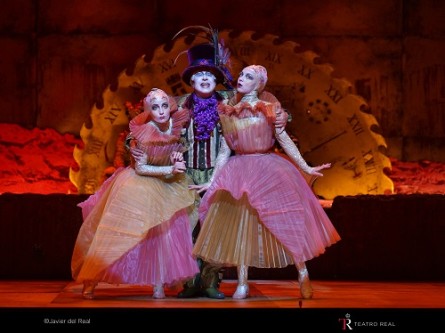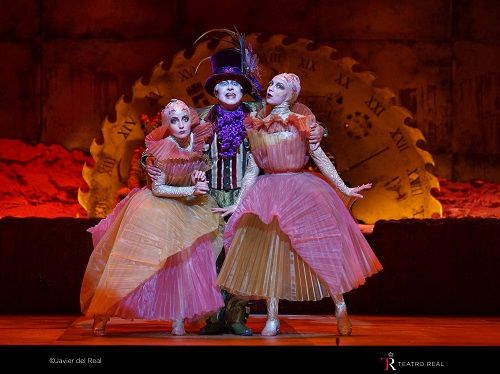
 Spain Ullmann: Der Kaiser von Atlantis, Teatro Real Orchestra, Pedro Halffter (conductor), Teatro Real, Madrid, 10.6.2016 (JMI)
Spain Ullmann: Der Kaiser von Atlantis, Teatro Real Orchestra, Pedro Halffter (conductor), Teatro Real, Madrid, 10.6.2016 (JMI)
New Production in co-production with Seville’s Maestranza and Valencia’s Palau de Les Arts
Direction: Gustavo Tambascio
Sets: Ricardo Sánchez Cuerda
Costumes: Jesús Ruiz
Lighting: Felipe Ramos
Choreography: Nuria Castejón
Cast:
Kaiser Overall: Alejandro Marco-Buhrmester
Death: Torben Jürgens
Speaker: Martin Winkler
Drum Major: Ana Ibarra
Harlequin: Roger Padullés
Bubikopf: Sonia de Munck
Soldier: Albert Casals
This Viktor Ullmann opera, staged at Teatro Real for the first time, has several points in common with their recent production of Arnold Schönberg’s Moses und Aron. Both date from the first half of the 20th century, both were premiered years after the death of their composers and, finally, Ullmann was a Schönberg disciple.
Today the opera is mainly known for the vicissitudes of its composition, and for the real miracle that the work was saved from Nazi barbarism. The libretto and score were written in Theresienstadt, a concentration camp that was often praised in Nazi propaganda. In this camp, thousands of Jewish artists, musicians and writers supposedly lived in freedom; in reality, many, including Viktor Ullmann, were eventually taken to Auschwitz to be gassed. Ullmann wrote the score for the musicians and singers who were available to him in the camp, and the opera came close to being performed, but the Nazis did not allow that to happen.
Somehow the handwritten score survived Theresienstadt, and after the war travelled first to England and then to Amsterdam. Kerry Woodward came into possession of it, along with other Ullmann compositions, and created his own version of the opera, which was premiered in 1975. The work has never entered the repertoire of the major opera houses, but has been offered by smaller companies in its original version with thirteen musicians.
Teatro Real decided to stage the opera and commissioned a new version for a full orchestra from Pedro Halffter. Regardless of the brilliant work of orchestration carried out by Mr. Halffter, I do have doubts about the adequacy of this new work. It is not an opera for a large house but rather, as Jorge Fernández Guerra writes in the program, it suggests a cabaret format with elements of jazz.
Der Kaiser von Atlantis runs about an hour and needs to be complemented with another work, as often happens with these short operas. Teatro Real decided to program three short works by Ullmann: “The Song of Love and Death of Cornet Christoph Rilke,” “Adagio in Memory of Anne Frank,” and “Little Overture to Der Kaiser von Atlantis.” The latter two works are based on Ullmann’s Sonata for Piano No. 7 with an orchestration by Pedro Halffter. This seems an appropriate program for a concert hall, but much less so for an opera house.
The production is by Gustavo Tambascio, who also arranged the staging for the three concert pieces that opened the show. The stage is attractive, with two different sets: the upper one is dominated by a large clock, while the bottom represents the bunker where the Emperor rules. The costumes are attractive, the lighting is good, and the choreography suits the opera. The direction is interesting, notably in its focus on images from the time and place of the opera’s composition; it ends with a series of characters who must remove their clothes before being gassed.
Pedro Halffter was both the author of the new orchestral version and the conductor. He proved to have an outstanding knowledge of the opera and offered an intense reading, drawing an excellent result from the orchestra.
Emperor Overall was correctly interpreted by baritone Alexander Marco-Buhrmester but without great brightness. Something similar can be said of bass Torben Jürgens, who lacked power in the character of Death. Martin Winkler was competent in the part of the Speaker. Both Roger Padullés (Harlequin) and Albert Casals (Soldier) were rather modest, while Ana Ibarra was acceptable as the Drum Major. Sonia de Munck sang Bubikopf with a wide vibrato.
José M. Irurzun
